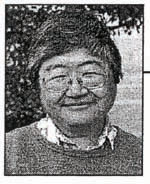
Janice Harumi Yen
Janice Harumi Yen is the recipient of NCRR's 2003 Fighting Spirit Award. As a founding member of NCRR, Janice exemplifies the determination, dedication and fighting spirit that made redress a reality. For over 22 years, Janice has devoted countless hours in the campaign for the passage of the Civil Liberties Act of 1988, and continued during the 1990's with the campaign to support and assist all who were denied redress. Highlights of her volunteer work include traveling to Washington, D.C. on several redress lobbying delegations, working with attorneys on redress denial cases, and, most recently, serving as the Assistant Producer for "Stand Up for Justice."
The first child of farming parents Masaharu and Haruko lwanaga in Santa Cruz, California, President Roosevelt had signed EO 9066 just one month before Janice's birth. When she was one month old, the family was sent to the Salinas Assembly Center, and at three months of age she and her parents were shipped off to the Colorado River (Poston) "Relocation Center" in Arizona. Two years laterJanice and her mother reunited with her father in Cleveland, Ohio where he had found work in a factory.
'Although I attended small, rural schools in San Martin and Morgan Hill, California, I had some wonderful teachers. I credit them for their positive influence on me. I learned that there was a spectrum of political and social views out there and that we have to analyze for ourselves what is the 'truth.' The 1942 internment had a profound effect on Japanese Americans, including myself. My parents and relatives never spoke about camp in terms of constitutionality and racism, subjects that were, too painful to discuss. I questioned why we, a farming family, spent six years of our lives outside of California in places that were 'too hot. too cold, and so far from home.' Also, our government's annihilation of over 100,000 civilians in the bombings of Hiroshima and Nagasaki was unfathomable and unconscionable to me. lt was in high school that I decided I would work for 'the common good.'
"Like many in the 1960's, I was impressed by the struggle of minorities for self-determination and equality. In the 1970's I was drawn to the Little Tokyo People's Rights Organization (which later became the National Coalition for Redress/Reparations) because of the intensity and determination of its membership to work for positive change and to redress some of the wrongs of the past. Today Nikkei for Civil Rights & Redress continues to support those who have suffered from discrimination and works for positive change in our community. I am deeply honored to receive the 2003 Fighting Spirit Award."